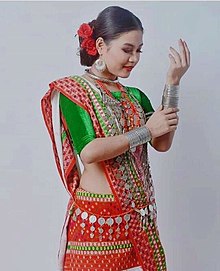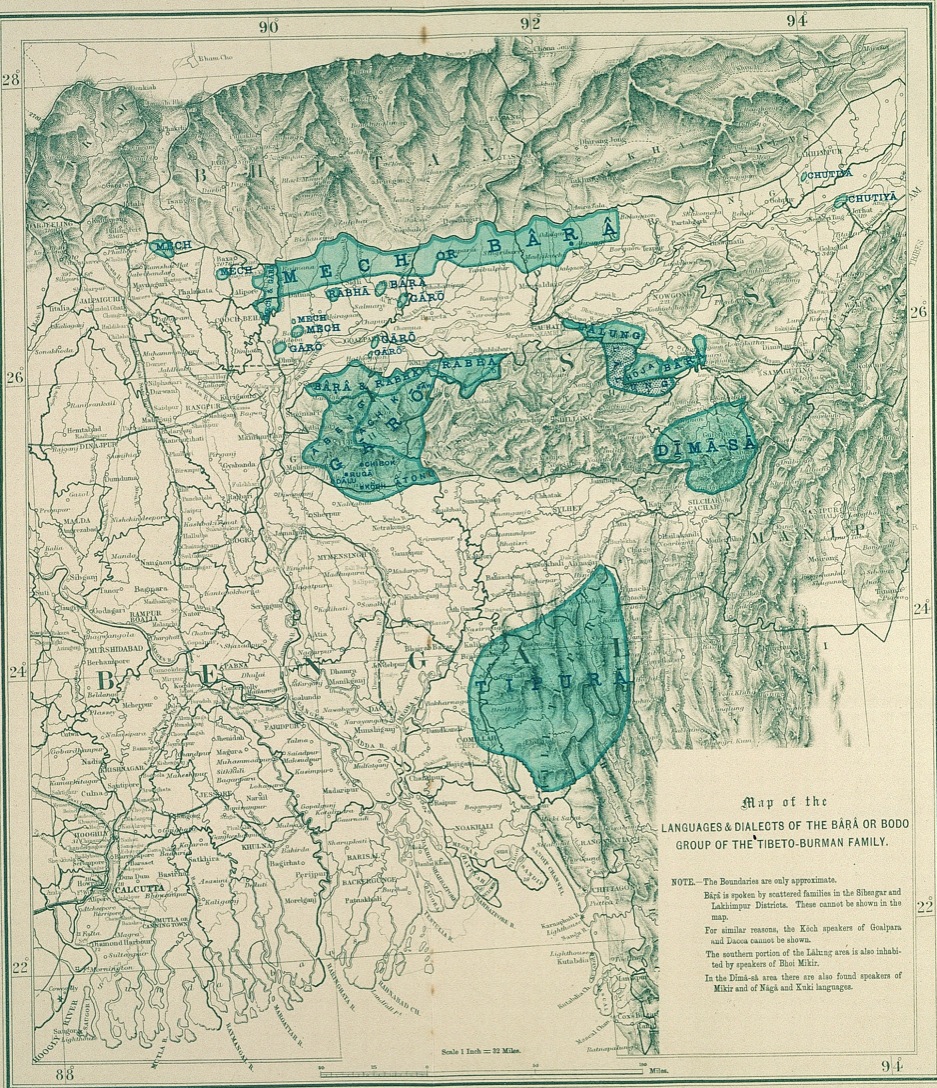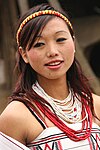Tripuri people
 Royal Flag of Tripura | |
 Tripuri woman in traditional attire | |
| Total population | |
|---|---|
| 3.5 million (2011) | |
| Regions with significant populations | |
| 1,011,294[1] | |
| Tripura | 950,875[1] |
| Mizoram | 32,634[1] |
| Assam | 22,890[1] |
| Meghalaya | 2,735[1] |
| Nagaland | 339[1] |
| Gujarat | 239[1] |
| Manipur | 208[1] |
| Jammu and Kashmir | 190[1] |
| Rajasthan | 169[1] |
| West Bengal | 120[1] |
| Maharashtra | 118[1] |
| Karnataka | 114[1] |
| 320,000+[2] | |
| Unknown | |
| Languages | |
| Kokborok (Tripuri) | |
| Religion | |
| Majority: Minority: Islam Christianity Buddhist | |
| Related ethnic groups | |
| |
The Tripuri (also known as Tipra, Tiprasa, Twipra) are an ethnic group originating in the Indian state of Tripura. They are the original inhabitants of the Twipra/Tripura Kingdom in North-East India and Bangladesh. The Tripuri people through the Manikya dynasty[3] ruled the Kingdom of Tripura for many years until the kingdom joined the Indian Union on 15 October 1949.
History[]

Tripuris are the native people of Tripura having its own unique and distinct rich culture, tradition, and history. They were able to expand their influence as far south as Chittagong Division, as far west as Comilla and Noakhali (known during the British period as 'plains Tipperah')and as far north as Sylhet Division (all in present Bangladesh). In the year 1512, the Tipperas were at the height of their supremacy when they defeated the Mughals. The ruling dynasty passed through several periods of history and ruled Tripura for several centuries until the 18th century, after which Plain Tippera became a colony of Britain and Hill Tippera remained an Independent Princely State. On 14 October 1949, Hill Tippera was merged into the newly independent India as Tripura State.
Language[]
The Tripuri people speak Kokborok (also known as Tripuri), a Tibeto-Burman language. Tripuri is the official language of Tripura, India. There are estimated to be more than one million speakers of the dialects of Tripuri in Tripura, and additional speakers in Mizoram and Assam in India, as well as Sylhet and the Chittagong Hill Tracts in Bangladesh.
There are three main dialects of Tripuri, though the central dialect of the royal family, Debbarma (Puratan Tripur), is a prestige dialect understood by everyone. It is the standard for teaching and literature. It is taught as the medium of instruction up to class fifth and as subject up to graduate level.
Historically, Tripuri was written in native Tripuri script known as Koloma, the earliest known writing in Tripuri dates from the 1st century AD, and was written in Koloma. The script was replaced by an alphabet based on the Eastern Nagari script. Currently the revival of ancient Koloma script is in process.
Some of the most notable Tripuri historical literary works, written by court scholars, include:
- The "Rajratnakar", The royal Chronicle of Tripuri kings
- The Rajmala, Chronicle of Tripuri Kings of Tripura
Religion[]
Religion among the Tripuri
According to the 2011 census, 93.60% of the Tripuri people follows admixture of Hindusim and Animist & 6.4% of the Tripuri people are Christians (majority Baptists). Tripuri Hinduism is a syncretic religion uniting traditional folk religion with Hindu elements, commonly found in Northeast India.[4]
Minority of Uchai clan in Tripuri are Buddhist.[5]
A minority of Tripuris, particularly in Bangladesh but also India,[6] have adopted Islam as their religion and have been subject to violence by some Tripuri Christians. On 18 June 2021,[7] a Tripuri imam and farmer called Omar Faruq Tripura (formerly known as Bennichand Tripura) of Tulajhiri Aga Tripurapara was shot whilst heading home from Isha prayers at a makeshift mosque.[8][9] Five out of the 38 families in this Tripurapara are Muslims and the rest are Christians.[10]
Society[]

The Tripuri people consist of clans, each with its own elementary social and administrative organisation starting from the village level and up to the chieftainship of the whole community.[11]

These indigenous communities enjoy their traditional freedom based on the concept of self-determination. The relation between the king and the subject communities was as Maharaja (king) of Tripura-Missip or liaison officer Roy or headman of the community – Sardar the chief of the village – the individual. Earlier, only the Debbarma or Tipra ethnic group was included in the Tripuri Kshatriya group. Later, the Raja included other groups like Reang, Jamatia and Noatia as well, in an attempt to foster a sense of kindness among the people under his region.[12]
The Tripuri people have a rich historical, social, and cultural heritage which is totally distinct from that of the mainland Indians. Their distinctive culture – as reflected in their dance, music, festivals, management of community affairs, dress and food habits – has a strong base. Kokborok, the lingua franca of the 12 largest linguistic groups of the indigenous Tripuris and other dialects spoken in Tripura are of the Tibeto-Burman group and distinct from those spoken in India. There is no influence from those spoken by other peoples in the north-eastern region.
The main Tripuri clans are:
Calendar[]
The Tripuris follow a traditional luni-solar calendar Tripurabda, which has 12 months and a 7-day week, like the Gregorian calendar.
The Tripura Era's New Year is on the 1st of Vaishakh which corresponds to 14 or 15 of April of Common_Era, depending on whether that year is a Leap year or not. The months are named in pan Indian months, time since its inception 1419 years back by Tripuri king Hamtor pha alias Himti pha alias Jujharu pha in 512 Saka Era.
Tripuri games and sports[]

Like many parts of the world the Tripuri has traditional sports. It is common in almost all the clans of Tripuri. They are called thwngmung in Tripuri.
Notable people[]
- Bir Bikram Kishore Debbarman – 1908–1947, one of the last Kings of Tripura.
- Sachin Dev Burman – Bollywood composer and singer.
- Rahul Dev Burman – Bollywood composer and singer.
- Kirit Bikram Kishore Deb Barman
- Pradyot Bikram Manikya Deb Barma
- Bibhu Kumari Devi – Rajmata of Tripura
- Kanchan Prava Devi
- Radha Kishore Manikya
- Birendra Kishore Manikya
- Maha Manikya
- N.C. Debbarma
- Dharma Manikya I
- Ratna Manikya I
- Nabadwipchandra Dev Burman– Indian sitarist and Dhrupad singer
- Kujendra Lal Tripura
- Pratap Manikya
- Sourabhee Debbarma – First female Indian idol winner, TV performer and singer.
- Riya Sen Dev Varma – Bollywood actress.
- Raima Sen Dev Varma – Bollywood actress.
- Somdev Devvarman – Indian tennis player. Somdev Devvarman created history[13] by becoming the first Indian to win a gold medal in the men's singles tennis event of the Asian Games. In 2011, Devvarman received the Arjuna Award[14][15] from the Indian government for his tennis successes. In March 2017, the Ministry of Youth Affairs and Sports, Government of India, appointed him as the national observer for tennis. In 2018, he was awarded with the civilian award Padma Shri.[16]
- Narendra Chandra Debbarma
- Jishnu Dev Varma
- Dasarath Deb
- Aghore Debbarma
- Sudhanwa Debbarma
- Bidya Debbarma
- Ranjit Debbarma
- Jotindra Lal Tripura
- Nagendra Jamatia
- Benichandra Jamatia – Padma Shri Indian folk writer and litterateur
- Mevar Kumar Jamatia
- Satyaram Reang – Padma Shri Indian folk performer and folk artist
- Shobha Rani Tripura
- Harinath Debbarma
- Tanushree Deb Barma, The First Woman IAS Officer of Tripura.
- Nanda Kumar Deb Barma
- Manoranjan Debbarma
- Rashiram Debbarma
- Aghore Debbarma
- Padma Kumar Debbarma
- Jashabir Tripura
- Ramendra Narayan Debbarma
- Harinath Debbarma
- Radhacharan Debbarma
See also[]
- Tipraland
- Tripuri culture
- Kokborok literature
- Tripuri nationalism
- Manikya Dynasty
- Tripuri calendar
- Tripura rebellion
- Buisu
- Ujjayanta Palace
- Neer Mahal
References[]
- ^ a b c d e f g h i j k l m "DISTRIBUTION OF THE 99 NON-SCHEDULED LANGUAGES- INDIA/ STATES/ UNION TERRITORIES-2011 CENSUS" (PDF). censusindia.gov.in. pp. 48, 49. Retrieved 10 April 2021.
Look for "92. TRIPURI", total number of Tripuri speakers in India given as 1011294 on page 48, then state wise break-up on page 49
- ^ "Probe sought into entry of 10,000 Bangladeshis in Tripura". The Hindu. 27 September 2021.
- ^ Jain, Anshika (11 June 2019). "Tripura's Ujjayanta: Seat of the Manikyas". LIVE HISTORY INDIA. It rose like a phoenix out of the ashes, quite literally. Situated in the city of Agartala is the exquisite Ujjayanta Palace, home of the Tripura royals and also a state museum. This delicate beauty was built in the late 19th century by Maharaja Radha Kishore Manikya of the Manikya dynasty, after a devastating earthquake flattened Agartala, the capital of Tripura. It went on to become a symbol of a modern phase in the Kingdom of Tripura. You may not have heard of them but the Manikya dynasty of Tripura is one of the oldest continuously reigning dynasties of India. The exact date of its founding is shrouded in legend – the Rajmala, a 15th century chronicle of the kings of Tripura, traces the history of the dynasty to the Mahabharata. But, historically speaking, the dynasty is said to have been founded by Ratna Manikya in 1267 CE. Retrieved 3 April 2021.
- ^ http://censusindiaindia.gov.in/Tables_Published/SCST/dh_st_tripura.pdf
- ^ "Buddhist monk from Tripura elected secretary general of the International Buddhist Confederation". Retrieved 9 August 2021.
- ^ "Tripuri Muslim girls get hands decorated with traditional "Mehendi" ahead of holy Eid". Tripura InfoWay. Agartala, India. 20 July 2021.
- ^ "Man called out of home, shot dead in Bandarban". The Daily Star. Bandarban Hill District, Bangladesh. 20 June 2021.
- ^ "মসজিদ থেকে বের হতেই নওমুসলিমকে গুলি করে হত্যা!" [New Muslim shot dead after exiting mosque]. 24 Live Newspaper (in Bengali). 19 June 2021.
- ^ "নওমুসলিম ইমামকে মসজিদের সামনে গুলি করে হত্যা" [New Muslim imam shot dead in front of mosque]. Daily Inqilab (in Bengali). 19 June 2021.
- ^ "বান্দরবানের রোয়াংছড়িতে গুলি করে একজনকে হত্যা" [Someone shot to death in Rowangchhari, Bandarban]. Prothom Alo (in Bengali). 19 June 2021.
- ^ Desk, Sentinel Digital (19 March 2020). "Tripuri community has started reviving its traditional bodies in Tripura - Sentinelassam". www.sentinelassam.com. Retrieved 30 January 2021.
- ^ Asian Studies, Volume 4 by Netaji Institute for Asian Studies, p.4
- ^ "Asiad: Somdev Creates History, India Retains 8th Spot". www.outlookindia.com. Outlook.com. 23 November 2010. Retrieved 13 April 2021.
- ^ "Somdev receives Arjuna Award". Hindustan Times. 20 September 2011. Retrieved 13 April 2021.
- ^ Agencies, New Delhi (20 September 2011). "Somdev Devvarman receives Arjuna Award". The Indian Express. Retrieved 14 April 2021.
- ^ "Kidambi Srikanth, Somdev Devvarman receive Padma Shri awards; Padma Bhushan for Dhoni - Times of India". The Times of India. Retrieved 13 April 2021.
External links[]
- Our Lyrics Kokborok Song Lyrics/Website
- Tripuri people
- Scheduled Tribes of India
- Ethnic groups in Bangladesh
- Ethnic groups in Tripura
- Ethnic groups in Northeast India
- Ethnic groups in South Asia
- Tripuri culture
- Bodo-Kachari
- Tripuri
- Sino-Tibetan-speaking people
- People from Tripura
- Hindu ethnic groups
- Hindu communities


